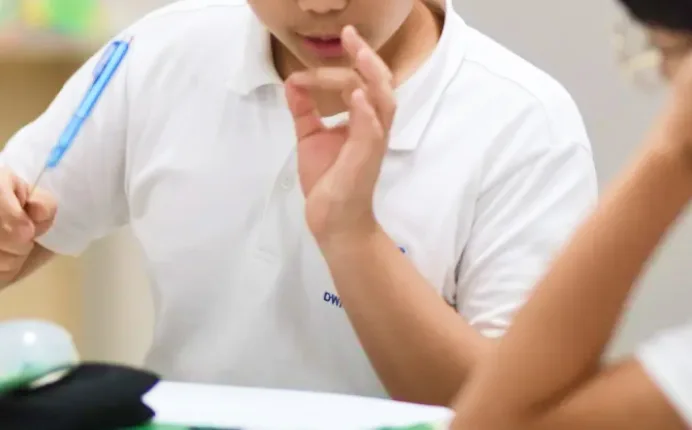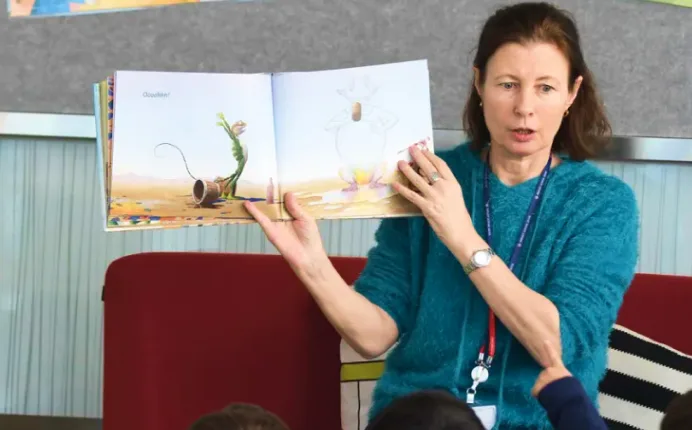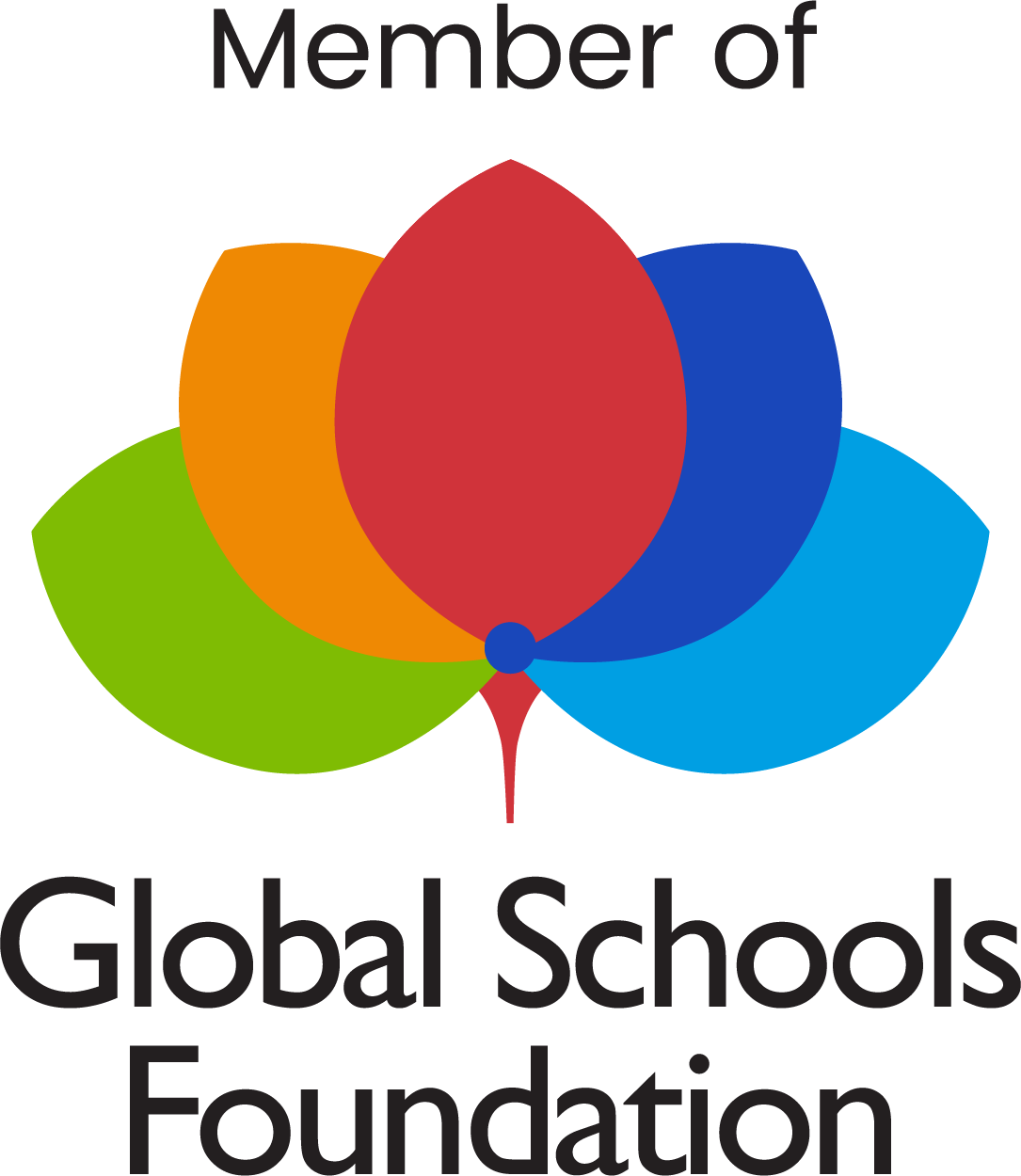Voyage English as an
Additional Language
IN THIS SECTION
WHAT IS VOYAGE?
Voyage is Dwight Seoul’s program for students who are learning English as an Additional Language. Our approach provides students who are learning English with the necessary tools to succeed in the classroom.
Voyage is designed to:
- Help students communicate and express themselves in both social and academic contexts so that they are able to engage successfully when learning through the IB programmes (PYP, MYP, DP).
- Encourage students to develop effective approaches to learning in English.
- Support work across the subjects by developing a comprehensive understanding of English.
In addition to building English language learning strategies and skills, the Voyage EAL specialists work closely with teachers to support students as they learn English and learn in English.


VOYAGE ACROSS DWIGHT SCHOOL
Early Childhood Division (ECD)
Preschool 3, Preschool 4, Kindergarten: Speech Language Therapy, Occupational Therapy
Primary Years Program (PYP)
Grades 1 through 5: Learning Support, Speech Language Therapy, Occupational Therapy
Middle Years Program (MYP)
Grades 6 through 10: Learning Support, Speech Language Therapy, Occupational Therapy
Diploma Program (DP)
Grades 11 and 12: Learning Support
VOYAGE SPECIALISTS

Are specialists in the acquisition of English as an additional language

Connect with students’ teachers and administrators

Are knowledgeable of the three-program IB curriculum

Communicate with teachers and families

Are inclusive, neurodiversity affirming, collaborative, and respectful of differences

Use evidence and data to set specific, measurable, and achievable goals and employ a variety of progress monitoring tools to track student growth

Know the expectations of each student’s Dwight EAL Learner Targets (DEALLT)

Provide written feedback on progress toward goals alongside the Dwight Seoul report cards
VOYAGE STUDENTS

Are a diverse group of learners with a variety of learning styles, strengths, language backgrounds, and

Are learning English as an additional language—this may be a second or third or fourth language depending on the student’s home language background and

Have a WIDA score of less than 4.0 in more than one domain (Listening, Speaking, Reading, Writing) and/or an overall score of less than 4.0.
HOW VOYAGE WORKS
Students can receive personalized EAL support in small groups, pairs, or individually depending on need. This support may take place in the classroom, a separate dedicated classroom, small spaces throughout the school, or in other dedicated learning spaces throughout the school (science labs, library, kitchen, etc.). Support takes place during the school day and is scheduled in two or four periods per week.
A request for support through Voyage can be made at any time by parents or teachers, and enrollment in Voyage will be determined based on evidence, data, and need. Students are typically assessed using the WIDA upon arrival and Voyage provisions are determined based on this outcome.
Voyage services will transition over time for each student as goals are met and needs change. Students will be exited from Voyage when the following criteria have been met:

Lower School
• WIDA Composite Score of at least 4.0, with a minimum 3.5 in Writing
• Fountas and Pinnell Text Level: K-G3 two levels within benchmark expectation, G4-5 within one level of benchmark expectations
• MAP Scores above the 15th percentile, with a growth trend in Reading and Language Usage (G4-5)
• Earns APPROACHING or MEETING on at least half of graded work in Literacy, Math, Science, Social Studies

Upper School
• WIDA Composite Score of at least 4.0 in each of the four domains
• MAP Scores above the 15th percentile, with a growth trend in Reading and Language Usage
• Earns APPROACHING or MEETING on at least half of graded work in English, Humanities, Science, and Math
Voyage Jump! into English
The Jump! into English program is designed for students from Grades 3 through 10 who are experiencing their first experience with learning English. This program is a dynamic and immersive language-learning experience designed to rapidly enhance English proficiency. Through small group sessions and one-on-one attention, students receive personalized instruction that caters to their individual learning styles. Essential language skills such as reading, writing, speaking, and listening comprehension, are covered which fosters a well-rounded language foundation. This program combines engaging classroom activities with interactive digital resources.
Students continue to attend courses with their peers and join the Jump! program twelve periods per week. This program is designed to be completed in one semester; following this semester, students will transfer to the Adventures in English program.
Voyage Adventures in English
Voyage offers a robust English as an Additional Language (EAL) program designed to assist students as they develop social and academic language skills in English. The Adventures in English program encompasses a range of specialized services and resources tailored to meet the unique needs of Dwight Seoul’s EAL learners. Initially, students undergo a thorough language assessment to determine their proficiency level and specific areas of need. Dedicated EAL specialists employ various strategies, including visual aids, hands-on activities, and bilingual resources, to facilitate comprehension and communication. Moreover, close collaboration between EAL specialists, classroom teachers, and parents promotes a cohesive and inclusive learning environment that nurtures linguistic growth and academic success for our students. Additionally, cultural sensitivity and appreciation are woven into the curriculum to foster a global-minded perspective among all students.
Students attend the majority of courses with their peers and join the Adventures in English program two or four periods per week. This program is designed to grow with students and support them as they expand their English language skills; after meeting the stated exit criteria, students will transfer to the English:Evolve program.
Voyage English:Evolve
The English:Evolve program is a structured framework designed to monitor students’ ongoing language development and academic progress. Once students have exited the Adventures in English program, they transition into a supportive phase of language learning. Regular communication takes place to gauge application of reading, writing, speaking, and listening skills. This data is used to tailor instruction and provide targeted support where needed. Additionally, periodic meetings involving EAL specialists, classroom teachers, and parents may take place.
Students participate in all courses and do not receive direct instruction from an EAL specialist as part of this monitoring program. English:Evolve is designed to be in place for one semester following exit from the Adventures in English program to ensure that these students continue to thrive academically and linguistically, with a focus on their smooth integration into IB classrooms and courses.
Voyage Classroom Support for English Learners
In a classroom setting, various supports are implemented to facilitate the learning experience for Dwight Seoul students who are learning English as an additional language. Firstly, visual aids play a crucial role in enhancing comprehension. Teachers incorporate a range of visual materials like charts, diagrams, and flashcards to reinforce concepts and vocabulary, providing a visual context that helps Voyage students grasp content more effectively. Additionally, bilingual resources, such as dictionaries or translated texts, are readily available to offer immediate assistance when encountering unfamiliar words or concepts. These resources serve as valuable reference tools, allowing Voyage EAL learners to independently navigate and understand the curriculum.
Furthermore, collaborative learning strategies are integral in supporting Voyage students. Pairing them with peers who are proficient in English encourages natural language acquisition through interaction and conversation. Cooperative activities and group projects promote communication skills, building confidence in using English in social contexts. Additionally, teachers often implement scaffolded instruction, breaking down complex tasks into manageable steps and gradually reducing support as students become more proficient. This method empowers EAL learners to tackle challenging material with confidence, ensuring they can successfully engage with the curriculum alongside their peers.
All learners benefit from a classroom environment that is rich in language, but especially students who are learning English. Teachers often employ strategies like labeling objects and areas in the room with both English and the students’ native language, providing a visual reference for vocabulary acquisition. Additionally, print-rich displays, including word walls, charts, and posters, help reinforce key concepts and language structures. A print-rich environment supports not only language development but also content comprehension, creating an inclusive space for all students to thrive.
Recognizing the diverse language proficiency levels within the classroom, teachers employ differentiated instruction techniques. This means tailoring instruction to meet the specific needs of each student. For Voyage students, this might involve providing additional resources like bilingual dictionaries, simplified texts, or audio materials. Furthermore, teachers may offer alternative assessments, allowing students to demonstrate their understanding through methods that align with their language abilities.
A dynamic and inclusive approach to language use, particularly in multilingual contexts. It involves seamlessly and purposefully drawing on one’s full linguistic repertoire, which may encompass multiple languages or dialects, to communicate effectively. Rather than compartmentalizing languages, translanguaging recognizes that individuals possess a rich linguistic tapestry that can be interwoven to enhance understanding and expression. This may involve code-switching, wherein speakers fluidly transition between languages, often within a single conversation or text. Translanguaging is not a sign of linguistic deficit, but rather a sign of linguistic resourcefulness, empowering individuals to convey complex ideas and emotions using the most accessible and expressive means available to them. It plays a crucial role in fostering inclusive and equitable learning environments, where students of diverse linguistic backgrounds can leverage their full linguistic repertoire for meaningful engagement and learning.
Scaffolded instruction is a crucial support for Voyage EAL learners. This involves breaking down complex tasks into smaller, manageable steps. Teachers provide clear explanations, use modeling techniques, and offer guided practice opportunities. As students gain confidence and proficiency, the level of support is gradually reduced. This approach allows EAL learners to access challenging material and build their language skills incrementally.
Peer interactions are invaluable when learning English. Group work and collaborative projects allow students to engage in authentic language use. Pairing Voyage students with peers who are more proficient in English provides opportunities for language modeling and peer support. These interactions foster social and academic language development, helping Voyage learners integrate into the classroom community while also advancing their language skills. Additionally, teachers may use structured discussion prompts or cooperative learning activities to encourage meaningful conversations, promoting language acquisition in a supportive setting.
